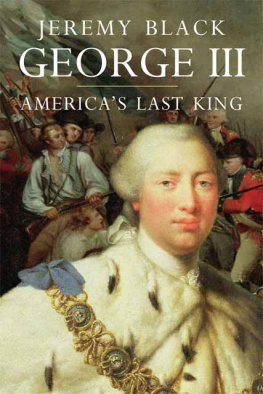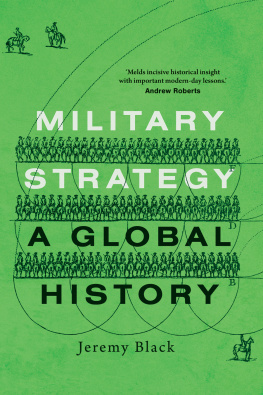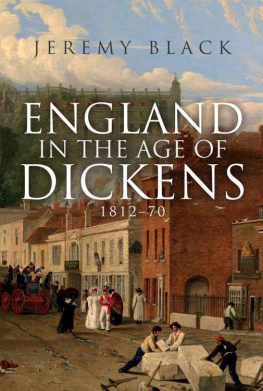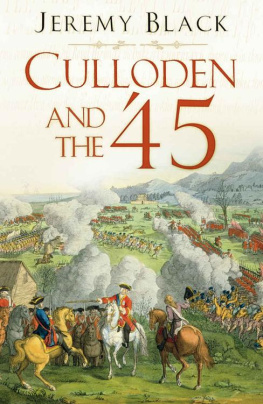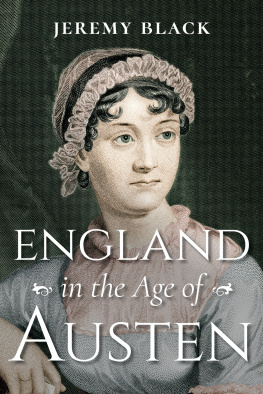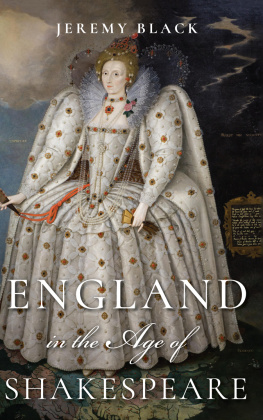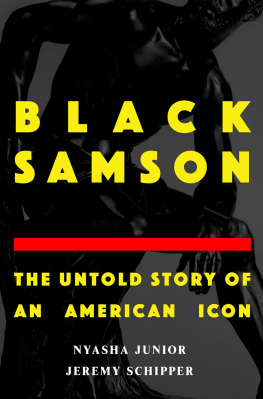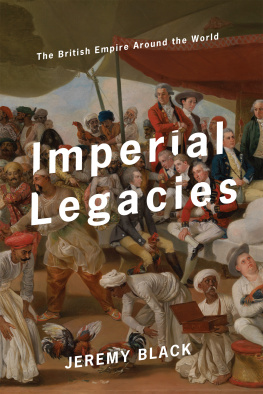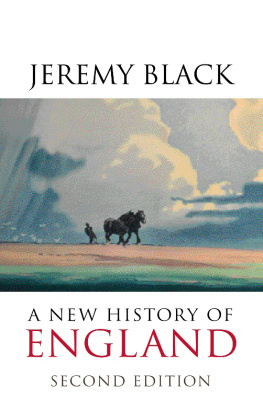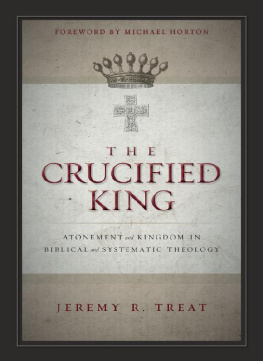Jeremy Black - George III: Americas Last King
Here you can read online Jeremy Black - George III: Americas Last King full text of the book (entire story) in english for free. Download pdf and epub, get meaning, cover and reviews about this ebook. year: 2006, publisher: Yale University Press, genre: Politics. Description of the work, (preface) as well as reviews are available. Best literature library LitArk.com created for fans of good reading and offers a wide selection of genres:
Romance novel
Science fiction
Adventure
Detective
Science
History
Home and family
Prose
Art
Politics
Computer
Non-fiction
Religion
Business
Children
Humor
Choose a favorite category and find really read worthwhile books. Enjoy immersion in the world of imagination, feel the emotions of the characters or learn something new for yourself, make an fascinating discovery.
- Book:George III: Americas Last King
- Author:
- Publisher:Yale University Press
- Genre:
- Year:2006
- Rating:4 / 5
- Favourites:Add to favourites
- Your mark:
- 80
- 1
- 2
- 3
- 4
- 5
George III: Americas Last King: summary, description and annotation
We offer to read an annotation, description, summary or preface (depends on what the author of the book "George III: Americas Last King" wrote himself). If you haven't found the necessary information about the book — write in the comments, we will try to find it.
George III: Americas Last King — read online for free the complete book (whole text) full work
Below is the text of the book, divided by pages. System saving the place of the last page read, allows you to conveniently read the book "George III: Americas Last King" online for free, without having to search again every time where you left off. Put a bookmark, and you can go to the page where you finished reading at any time.
Font size:
Interval:
Bookmark:
GEORGE III
Jeremy Black is professor of history at the University of Exeter. He is the author of biographies of William Pitt the Elder and of Sir Robert Walpole. Among his many publications are Maps and History (1997), War and the World (1998), Italy and the Grand Tour (2003) and The British Seaborne Empire (2004), all published by Yale University Press. He is a Fellow of the Royal Historical Society, Fellow of the Royal Society of Arts, and Member of the Order of the British Empire (MBE).
Also in the Yale English Monarchs Series
ATHELSTAN by Sarah Foot
EDWARD THE CONFESSOR by Frank Barlow
WILLIAM THE CONQUEROR by David Douglas
WILLIAM RUFUS by Frank Barlow
HENRY I by Warren Hollister
KING STEPHEN by Edmund King
HENRY II by W. L. Warren*
RICHARD I by John Gillingham
KING JOHN by W. L. Warren*
EDWARD I by Michael Prestwich
EDWARD II by Seymour Phillips
RICHARD II by Nigel Saul
HENRY V by Christopher Allmand
HENRY VI by Bertram Wolffe
EDWARD IV by Charles Ross
RICHARD III by Charles Ross
HENRY VII by S. B. Chrimes
HENRY VIII by J. J. Scarisbrick
EDWARD VI by Jennifer Loach
MARY I by John Edwards
JAMES II by John Miller
QUEEN ANNE by Edward Gregg
GEORGE I by Ragnhild Hatton
GEORGE II by Andrew C. Thompson
GEORGE III by Jeremy Black
GEORGE IV by E. A. Smith
Available in the U.S. from University of California Press

Copyright 2006 Jeremy Black
First printed in paperback 2008
All rights reserved. This book may not be reproduced in whole or in part, in any form (beyond that copying permitted by Sections 107 and 108 of the U.S. Copyright Law and except by reviewers for the public press) without written permission from the publishers.
For information about this and other Yale University Press publications, please contact:
U.S. Office:
Europe Office:
Set in Baskerville by J&L Composition, Filey, North Yorkshire
Printed in Great Britain by TJ International Ltd, Padstow, Cornwall
Library of Congress Cataloging-in-Publication Data
Black, Jeremy.
George III / Jeremy Black.
p. cm.(Yale English monarchs)
Includes bibliographical references and index.
ISBN 0300117329
1. George III, King of Great Britain, 17381820. 2. Great BritainPolitics and government17601820. 3. Great BritainKings and rulersBiography.
4. MonarchyGreat BritainHistory. I. Title. II. Series.
DA506.A2B53 2006
941.073092dc22
[B]
2006014067
A catalogue record for this book is available from the British Library.
ISBN 978-0-300-13621-0 (pbk)
10 9 8 7 6 5 4 3 2 1
Published with assistance from the Annie Burr Lewis Fund.
for Philadelphia friends
CONTENTS
ACKNOWLEDGEMENTS
In the years since 1977, when I first read letters written by George III in a systematic fashion, I have accumulated a number of debts of gratitude that I am happy to acknowledge. Material from the Royal Archives is cited by permission of Her Majesty the Queen. I would also like to thank the Duke of Bedford, the Marquess of Bute, Earl Fitzwilliam and the Wentworth Woodhouse Trustees, the late Earl Harrowby and the Trustees of the Harrowby Manuscripts Trust, the Earl of Elgin, the Earl of Malmesbury, the late Earl Waldegrave, Lady Lucas, Sir Hector Monro and John Weston-Underwood for permission to consult their collections of manuscripts, and the late Earl Waldegrave for his hospitality at Chewton. Lars Struve facilitated access to material on a trip to the Rigsarkivet in Copenhagen, and Steven Blake, Judith Curthoys, Kate Harris, Lorna Haycock, Helen Morse, John Paddock, Ann Smith, Joanne Smith, Jill Tovey and Deborah Watson proved helpful British archivists. I am most grateful to Robert Ingram for help with Secker's papers, to Jim Davies, a true Weymouth expert, and to Earl Bathurst for his advice.
Knowledge of how busy academics can be underlines my gratitude to Nigel Aston, Grayson Ditchfield, Bill Gibson, Matthew Kilburn, Bill Purdue and two anonymous readers for their helpful comments on an earlier version. In addition, Charles Fedorak, Will Hay, Colin Haydon, Nick Henshall, Peter Hoffenberg, William Liddle, Philip Mansel, Jonathan Marsden, Marilyn Morris, Clarissa Campbell Orr, Andrew O'Shaughnessy, Torsten Riotte and David Watkin commented on particular chapters, and I have also benefited from advice from David Aldridge, Peter Barber, Michael Duffy, Piers Mackesy, Frank O'Gorman, Robert Peberdy, Nicholas Rodger, Janet Snowman, Will Tatum, James Thomas and Reg Ward. The University of Exeter and the German Academic Exchange Scheme provided crucial support on archival research trips. I have been helped by the opportunity to present papers to conferences on the personal unions of SaxonyPoland and HanoverBritain and on the Hanoverian dimension in British policy and politics held at Dresden and Cambridge, respectively, as well as to the University of Virginia's School of Continuing and Professional Studies summer schools on the American War of Independence, to a History Staff Research Day at the University of Exeter, at Mary Washington and Mississippi State universities and at the University of Plymouth.
Robert Baldock has proved an exemplary editor and a continued encouragement. It is always a pleasure to record my gratitude to Sarah, but particularly so for this book. The ability to discuss matters with a consultant psychiatrist is especially useful when the subject is George III, yet a family holiday in 1989 on the island of Bute that also enabled me to work on the papers at Mount Stuart is a stronger memory.
Dedicating a book is both a joy and the opportunity to record thanks and gratitude, and yet also a problem if one is supposed to match dedicatee with subject. Perversely, given its role in the American Revolution, I do so with this volume in thanking friends I have met through many visits to lecture in Philadelphia, most frequently to the Foreign Policy Research Institute. It is by far my favourite of the big cities on the East Coast, in part because of the fine buildings, many of which make it seem more redolent of an eighteenth-century British city than most in Britain, because of the scale, bustle and variety of the streets, and because of my friends, Jean-Loup Archawski, Annette Bonacquisti, Will Hay, Herb Kaplan, Alan Luxenberg, Harvey Sicherman and the late Russell Weigley. I knew it a nonsense when the guide in Liberty Hall referred to George III as a tyrant, but I could not help but be moved by the quest for liberty that this fine city represents.
PREFACE
With modern writers everything is either vice or virtue complained the anonymous author of the Reflections on Ancient and Modern History (1746). However moral he sought to be, the life of George III (17381820) is not a simple morality tale. It contained strongly etched episodes, and the last years of the king had a pathos in apparently blind, neglected madness that led to unfounded comparisons with King Lear, but much of his life lacked the dramatic darkness of the neo-Gothic, however much contemporaries, particularly Horace Walpole, searched for such a secret history. Yet, if, as biography, there is not what those craving sensation sought indeed the notorious madness has been explained as the symptoms of the disease porphyria this is still a life full of importance and interest, necessarily so being that of America's last king.
Here readers should pause. If you like interpretation to arise with the text, and to follow the author through the discussion, please stop, read the book, and return to this Preface at the close. This is not only because to offer interpretation at the outset may unreasonably foreclose your analysis, but also because my preference is for the interpretation to unfold, not to be made clear at the outset.
Next pageFont size:
Interval:
Bookmark:
Similar books «George III: Americas Last King»
Look at similar books to George III: Americas Last King. We have selected literature similar in name and meaning in the hope of providing readers with more options to find new, interesting, not yet read works.
Discussion, reviews of the book George III: Americas Last King and just readers' own opinions. Leave your comments, write what you think about the work, its meaning or the main characters. Specify what exactly you liked and what you didn't like, and why you think so.

